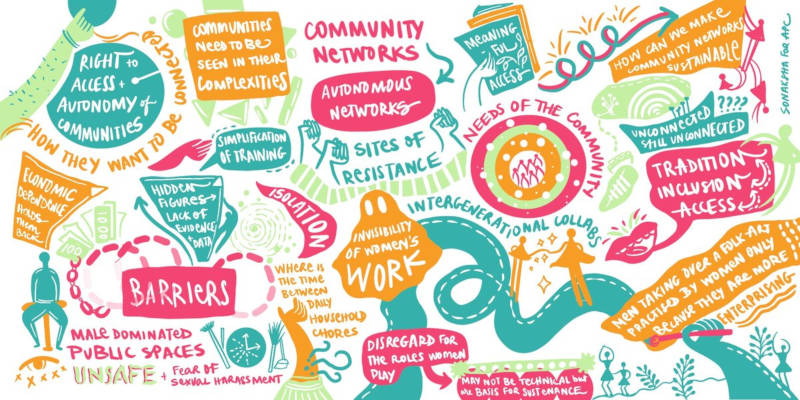Access to meaningful, reliable, secure and affordable internet is no longer a luxury but a basic human right. However, there still exists a digital divide, especially in rural, marginalized and underserved areas where it’s not economically viable for traditional telecoms and internet service providers to reach. Women and girls face additional socio-economic barriers to getting connected. Built by the people, for the people and with the people, community networks are increasingly becoming a viable bottom-up alternative approach in connecting the unconnected. These networks can also become a catalyst in bridging the gender digital divide.
During the 2019 Internet Governance Forum in Berlin, Ms. Miliza participated in a round table discussion on the role of community networks in promoting gender inclusion. The session: “Towards Equitable and Sustainable Community-Led Networks” was organized by the Association of Progressive Communications, and the Internet Society and was moderated by Ms. Kira Allman (Postdoctoral Research Fellow, University of Oxford). Panelists included Ms. Sarbani Banerjee Belur (Technical Community, Asia-Pacific Group and Senior Research Scientist, Gram Marg Rural Broadband Initiative, Indian Institute of Technology (IIT) Bombay), Ms. Nicola Bidwell (Professor of Computer Science (HCI), University of Namibia), Ms. Josephine Miliza (African Regional Co-ordinator, APC LocNet Project- KICTANET), Ms. Valeria Betancourt (Policy Programme Manager, APC) and Ms. Jane Coffin (Senior Advisor to the CEO, Connectivity & Infrastructure, Internet Society (ISOC).
The session started with Ms. Allman setting the scene by giving an overview of community networks and why they matter in achieving the Sustainable Development Goals by 2030. In her introduction she mentioned that commercial operators are expected to connect 60% – 70% of the world’s population by 2025, meaning the achievement of Sustainable Development Goal 9C (SDG) is far fetched. Communities across the globe are building and operating their own access infrastructure offering an alternative approach to connecting the unconnected. These networks are built and achieving universal and affordable access to information and communications technology. Beyond access, Ms. Allman highlighted the potential of community networks to address inclusivity challenges to ICTs providing new pathways for greater equality. She welcomed the panelists to the discussion to share their lived experiences working in and with community networks.
Ms. Sarbani started the conversation sharing her experience working in Gram Marg Rural Broadband initiative for the past 5 years connects 34 villages near Bombay. Earlier on, their focus was on providing access. After research, it was discovered that women faced unique barriers such as inability to access the network at night since access points were in unsafe areas, lack of relevant content, and censorship by male family members in accessing some content they deemed improper. To address these challenges, Ms. Sarbani worked on ensuring access points were installed in areas where women had full-time access. She also works with women entrepreneurs on how they can utilize digital platforms.
Ms. Bidwell followed and introduced herself as a woman technologist and academic in the field of Human-Computer Interface(HCI). She said she considered herself a grand aunt of community networks. Her journey started in 2008 when she lived in rural South Africa and attempted to set up a wireless network which was followed by her starting a solar-powered digital content sharing station. She was introduced to community networks by Dr. Carlos Rey Moreno who seeded a CN in Zenzeleni. Since then she has been a great aunt to community networks in Namibia with varying degrees of success.
Ms. Miliza similarly shared her journey on initiating a community network in Kibera, Nairobi Kenya. She quickly learned the importance of the human factor in promoting the uptake of digital technologies. She said that women should be actively involved in community networks as they are more grounded in ensuring sustainable livelihoods for their children and families. This greatly influenced the creation of training programs to ensure that the benefits and the use of connectivity are understood properly by women in the community.

Ms. Valeria shared the APC-LOCNET project whose aim is to create an environment for the growth and sustainability of community networks. She explained how the project achieves this; in supporting 12 community networks from Africa, Latin America and Asia through grants, peer learning, capacity building, movement building, and policy advocacy. She also talked about how these networks not only face technical challenges but also social and unfavorable policy environments.
Ms. Jane who was representing ISOC shared their work in supporting community projects across the globe. She also talked about ISOC’s engagement with local stakeholders to positively affect change at the community level. She mentioned the policy and regulatory challenges faced by community networks and the importance of addressing them.
Ms. Miliza also added how economic factors such as women earning lower wages compared to their male counterparts contributed to gender exclusion. She shared that many women, especially those living in marginalized and rural areas are still economically dependent on men due to the wage gap. Other factors contributing to gender exclusion she identified are the lack of content and platforms that consider the unique needs of women and attributed this to the low numbers of women that participate in the design of technologies and applications.
The full session can be found here.
Josephine Miliza is a network engineer passionate about enabling communities in Africa to leverage digital technologies for socio-economic empowerment. She is currently the Africa regional coordinator for the APC-LOCNET project working under KICTANET. Twitter – @jossie.miliza. The beautiful illustrations were done for APC by Sonaksha – @sonakshaiyengar




